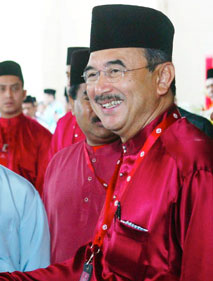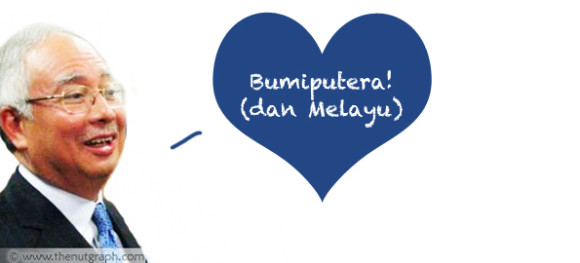
TWO days before our 50th Malaysia Day, Prime Minister Datuk Seri Najib Razak announced a new set of affirmative action policies under the Bumiputera Economic Empowerment (BEE) agenda.
Many were indignant. Reformists, including Tengku Razaleigh Hamzah and Datuk Zaid Ibrahim, called for a move away from race-based development policies to inclusive models of economic growth. Others analysed the BEE presentation in the context of the 5 May 2013 general election results or the upcoming Umno elections.
The fact is, affirmative action is discriminatory — it’s sometimes called “positive discrimination”. And many forms of discrimination are unfair. But here’s another fact — research also shows that some institutions and perceptions in Malaysia systematically discriminate against bumiputeras’ socioeconomic prospects. So how can we think about fixing these injustices without introducing new ones?
Discoursing affirmative action
To genuinely level the playing field, we need clear-sighted analysis of the underlying realities to properly design effective affirmative action programmes. Some inequalities can be dealt with by improving socioeconomic access in race-neutral programmes. Others, such as persistent negative stereotypes in the labour market, may need category- or race-specific action.

But we rarely get to that level of analysis, even though affirmative action is a perennial topic in public discourse. Instead, cabinet ministers and government leaders champion pro-Malay policies while casually blaming non-Malays for a range of societal ills. Deputy Transport Minister Datuk Abdul Aziz Kaprawi and Umno senator Datuk Seri Mohd Ali Rustam both recently painted Chinese Malaysians as economic oppressors of Malay Malaysians. Meanwhile, Home Minister Datuk Seri Zahid Hamidi identified gangsters as being mainly Indian Malaysians, using alleged Malay victimhood to justify shoot-first policies and the draconian Prevention of Crime Act.
From a non-Malay perspective, the preferential framework, especially in public university admissions, is prominent among the grievances that have been fuelling the brain drain.
Often, the various groups just talk past each other and struggle to listen and respond constructively. Abdul Aziz’s wish for more Mercedes-owning middle-class Malays was castigated for seeking to widen the wealth gap while “covering up the problems of people in the other strata”. In fact, although Abdul Aziz was guilty of crude generalisations — not least about unscrupulous “tauke-tauke” — he had also offered suggestions for decreasing the incidence of rich bumiputeras leaving the poor behind.
Data and policy
If the government is sincere about building broad-based support for sustainable economic equality, it must use its resources and authority to enrich the affirmative action discourse.
To do that, it needs to produce rigorous data about economic realities. Despite tremendous government databases about national economic and interethnic circumstances, policy presentations on affirmative action tend to be sketchy on statistics. This doesn’t just compromise the public’s capacity to hold the government accountable for policy efficacy. It also fuels scepticism among naysayers.
Najib’s BEE speech did cite some socioeconomic data such as the average bumiputera household income, bumiputera poverty and urban residence rates; and the bumiputera share of equity ownership, effective corporate control, and property transactions. These however were aggregated at the national level, and few were matched to policy initiatives. Details would have been far more persuasive. For example, X percent of adult bumiputeras in rural areas are illiterate. Literacy has been shown to improve job prospects and financial management. So, we are allocating Y in funding for all-ages literacy night classes in rural primary schools.
Facts, if wielded wisely, can cut through rhetoric. In 2011, academics Lee Hwok-Aun and Muhammad Abdul Khalid sent out over 3,000 fictitious resumes to demonstrate racial discrimination against Malay Malaysians in private sector employment. This was far more compelling than the usual invective against Chinese Malaysian “taukes”. Such research could easily be furthered using data from the Human Resources Ministry’s Jobs Malaysia portal, which, in 2012, held information on more than 300,000 active users. This analysis could then inform equal-opportunity monitoring of employment decisions.

Besides this lack of clarity about pro-bumiputera policies, affirmative action proponents also avoid justifying such policies with reasons that encompass the wider citizenry. Najib’s BEE speech was unapologetic in addressing just the bumiputera. Even within the bumiputera identification, his presentation played with divisions. Although he generally used “bumiputera” in the collective sense, he began and ended his speech with “Melayu dan bumiputera”. At one point, he also distinguished between “bumiputera Islam” and “bumiputera bukan Islam”, without any policy-relevant reason for the separate categories.
When national policies pivot on differences within the populace, it is even more imperative to articulate unity rather than division. The rationale for affirmative action should never be: There are systematically disadvantaged bumiputeras, and the Umno-led government must help them because they are bumiputeras.
Rather: There are systematically disadvantaged bumiputeras, and the Malaysian government must help them because they are Malaysians.
Veil of ignorance
The discourse on affirmative action should go beyond merely supporting it on ethno-nationalist grounds or dismissing it on the basis of meritocracy. There is a device in political philosophy called the “veil of ignorance” to test for unfair biases. What kind of society would we construct for ourselves if we were ignorant of our place in society, class, social status, intelligence, natural assets and wealth? (John Rawls, A Theory of Justice, 1971)
Or, in our context: What sort of educational and economic landscape would I want if I had no idea whether I would be born the child of overseas-educated Chinese Malaysian professionals or of Orang Asal who work multiple jobs in plantations and construction sites?
Another way of examining the issue would be to ask, how would I feel about bumiputera policies, if I were in their shoes? Or if I were in a similar position?
For example, if reliable data shows that female graduates are less likely to be hired than male graduates because employers perceive women to be less competent, would I support a system to monitor fairness in hiring? Certainly. But if reliable data shows that women tend to accumulate less wealth than men at every income level, would I support a woman-exclusive investment fund that gave above-market returns? Maybe, but not if its structure gave most of the gains to women who were already rich.
By extension, our pursuit of nuanced and equitable affirmative action can and should draw from corresponding policy projects elsewhere. There is an extensive body of research on giving women fair opportunities in the workforce. The U.S. has a contentious and fascinating history of attempts to mitigate socioeconomic biases against African-Americans. South Africa’s post-apartheid Black Economic Empowerment, which aims to overturn historic disadvantages against the majority ethnic group, has curious echoes with the Malaysian experience. While there are differences between those programmes and ours, methods and principles may overlap.
Remaining resiliently naïve

In a New York Review article on veteran environmentalist Bill McKibben, Verlyn Klinkenborg writes:
“Like the organizers of most battles for social justice, Bill McKibben and 350.org are working to redemocratise this country. … [That] means … refreshing the resiliently naïve expectation that our representatives will actually represent us. … It’s all too easy to give in to cynicism or go home to the farm and the bees. Better, perhaps, to be surprised [by recurring antidemocratic practices], if only because it helps fuel the kind of outrage you feel in Bill McKibben, who is the most rational of men.”
If we are serious about combating all kinds of inequalities in Malaysia, we will have to hold on to such resilient naïveté. We must argue for long-term investments in policies that improve educational and employment prospects at the grassroots, even while knowing that such initiatives may not appeal to election-oriented politicians or their contract-seeking cronies.
We have to advocate for affirmative action on the basis of an imperfect but vital national identity — rather than supporting it out of convenient ethno-nationalism, or discarding it in a short-sighted form of liberal equality. Let’s work for us. ![]()
Hwa Yue-Yi will be taking a break from this column as she begins training for the Teach For Malaysia 2014 cohort. She thanks The Nut Graph team and readers for many lessons over the past two years.


Marketrealist says
Private sector bias against Bumiputera is a direct consequence of the NEP policies. Most non-Bumis have personally seen how unqualified Bumis have been given placement in education over them. Hence, it is a natural presumption to question any Bumi on their qualifications.
Your article leaves out Indian [Malaysians]. They are discriminated against by both the private and public sector. Without [being] economically [on a] level-playing field, and with severe discrimination from everyone, they are discouraged. We are creating an underclass with clear and direct intention.
neptunian says
Let’s face it. The BN govt is regressing to 15th century feudal and tribal practices in Malaysia, while its foreign PR firm tries to spin about “inconclusiveness” and moderation to the Western world.
Will this change? Sadly no, the govt has been very successful in keeping the majority of people “unthinking” thru its education system.
Pratamad says
Thanks to the author for the cool-headed analysis of the issues at stake. Sadly, political expediency is by now the defining characteristic of Najib’s leadership, if one even cares to call it leadership at all. It pains me tremendously when that’s contrasted with the patience and seriousness professed by the article.